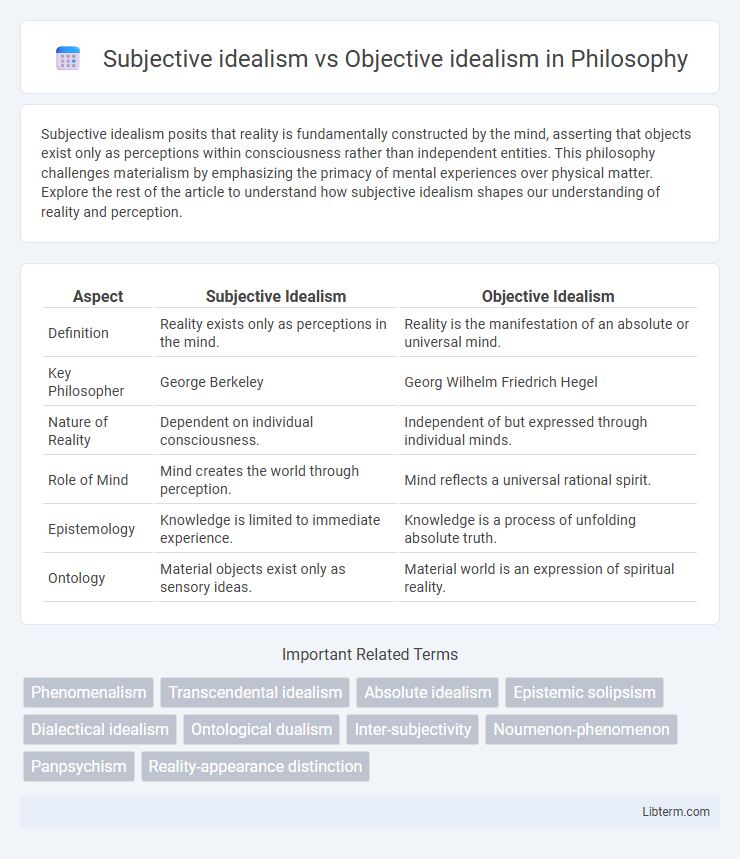Subjective idealism posits that reality is fundamentally constructed by the mind, asserting that objects exist only as perceptions within consciousness rather than independent entities. This philosophy challenges materialism by emphasizing the primacy of mental experiences over physical matter. Explore the rest of the article to understand how subjective idealism shapes our understanding of reality and perception.
Table of Comparison
| Aspect | Subjective Idealism | Objective Idealism |
|---|---|---|
| Definition | Reality exists only as perceptions in the mind. | Reality is the manifestation of an absolute or universal mind. |
| Key Philosopher | George Berkeley | Georg Wilhelm Friedrich Hegel |
| Nature of Reality | Dependent on individual consciousness. | Independent of but expressed through individual minds. |
| Role of Mind | Mind creates the world through perception. | Mind reflects a universal rational spirit. |
| Epistemology | Knowledge is limited to immediate experience. | Knowledge is a process of unfolding absolute truth. |
| Ontology | Material objects exist only as sensory ideas. | Material world is an expression of spiritual reality. |
Introduction to Idealism Philosophies
Subjective idealism asserts that reality is fundamentally dependent on the mind and perceptions, emphasizing that objects exist only as they are perceived by conscious beings. Objective idealism, in contrast, posits that reality exists independently of individual minds but is ultimately shaped by a universal or absolute consciousness. Both philosophies explore the nature of existence through the lens of mental or spiritual phenomena, challenging materialist conceptions of reality.
Defining Subjective Idealism
Subjective idealism posits that reality is mentally constructed and dependent on the perceiving subject, asserting that objects do not exist independently of consciousness. This philosophy, championed by George Berkeley, argues that material substance is unnecessary and that existence is fundamentally tied to perception. In contrast, objective idealism maintains that reality exists independently of individual minds, with a universal or absolute mind underpinning all objects and truths.
Defining Objective Idealism
Objective idealism asserts that reality exists independently of individual perception, emphasizing that universal consciousness or a collective mind underpins the physical world. Unlike subjective idealism, which holds that reality is mentally constructed by individual observers, objective idealism posits an absolute, mind-dependent reality that is consistent and shared externally. Philosophers such as G.W.F. Hegel advanced this view, suggesting that the cosmos operates through a rational, all-encompassing spirit or Idea manifesting in material phenomena.
Historical Origins of Subjective Idealism
Subjective idealism, primarily developed by George Berkeley in the early 18th century, asserts that reality consists only of minds and their ideas, with no existence independent of perception. This philosophy emerged as a response to materialism and skepticism, emphasizing the role of the perceiver in creating the existence of objects. In contrast, objective idealism, associated with philosophers like G.W.F. Hegel, posits that reality is shaped by an absolute or universal mind independent of individual subjective experience.
Historical Roots of Objective Idealism
Objective idealism, historically rooted in the works of philosophers like Georg Wilhelm Friedrich Hegel, emphasizes that reality is shaped by an absolute or universal mind rather than individual perception. This contrasts with subjective idealism, associated with George Berkeley, which holds that objects exist only as perceptions in individual minds. Hegel's dialectical method and notion of the Absolute Spirit influenced 19th-century German Idealism, asserting that the external world is a manifestation of a collective, rational consciousness rather than merely subjective experience.
Key Philosophers and Their Contributions
George Berkeley, a central figure in Subjective Idealism, argued that objects only exist as perceptions in minds, famously summarized by "esse est percipi" (to be is to be perceived). In contrast, G.W.F. Hegel, a key philosopher of Objective Idealism, proposed that reality is the expression of an absolute, universal mind or spirit that manifests through history and culture. Both philosophies emphasize the primacy of consciousness but diverge on whether reality depends on individual perception or an overarching, collective intellect.
Core Differences Between Subjective and Objective Idealism
Subjective idealism asserts that reality is fundamentally dependent on individual perception, emphasizing the mind's role in shaping existence, whereas objective idealism posits that reality exists independently of any single mind but is ultimately grounded in a universal or absolute consciousness. The core difference lies in the locus of reality: subjective idealism centers reality within personal experience, while objective idealism locates it in a collective or overarching mind. This distinction impacts metaphysical interpretations of existence, knowledge, and the nature of objects beyond human perception.
Major Criticisms of Both Perspectives
Subjective idealism faces major criticism for its assertion that reality depends entirely on individual perception, leading to solipsism and undermining the existence of an objective world. Objective idealism is criticized for attributing reality to a universal mind or spirit, which many argue is metaphysically speculative and lacks empirical evidence. Both perspectives struggle with explaining the interaction between mind and matter, raising questions about the nature of consciousness and external reality.
Contemporary Relevance and Debates
Subjective idealism asserts that reality depends on individual perception, influencing contemporary debates in philosophy of mind and virtual reality, where experience shapes existence. Objective idealism posits that reality exists independent of individual minds but is fundamentally mental or spiritual, impacting discussions in metaphysics and theology about the nature of consciousness and the universe. Current debates explore the implications of these views for artificial intelligence, quantum mechanics, and the possibility of a unified theory of consciousness.
Conclusion: Bridging Subjective and Objective Idealism
Subjective idealism asserts that reality is fundamentally dependent on the mind, while objective idealism posits an independent, universal consciousness shaping existence. Bridging these views involves recognizing individual perceptions as expressions of a shared, absolute mind that unites personal experience with a collective spiritual reality. This synthesis highlights a dynamic interaction where subjective awareness and objective essence coexist, forming a comprehensive understanding of idealist philosophy.
Subjective idealism Infographic

 libterm.com
libterm.com